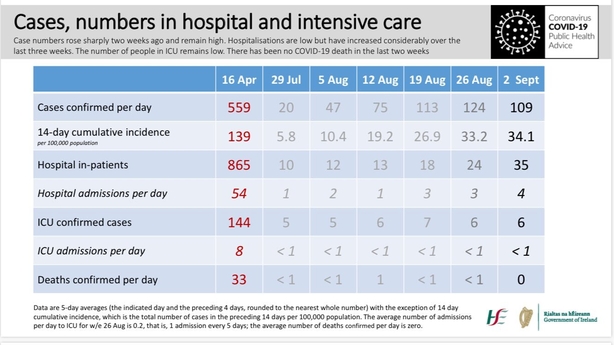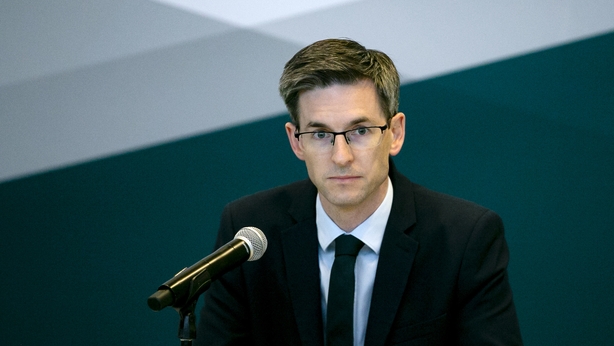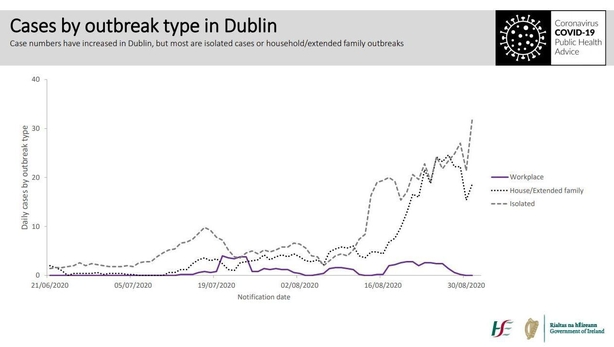The Department of Health has been notified of 89 additional cases of Covid-19 and one further death.
There has been a total of 1,777 coronavirus-related deaths in Ireland following the denotification of one previously confirmed case. Case numbers now stand at 29,114.
The R number, which is the average number of people one infected person will transmit the virus to, is now just above 1, possibly as high as 1.2.
The one further death reported today relates to June.
Professor Philip Nolan, chair of NPHET Irish Epidemiological Modelling Advisory Group, said it was, in fact, more than two weeks since somebody had died with Covid-19 in Ireland.
He said the epidemic is "stable or growing very slowly. It is still higher than we would like".
Prof Nolan also warned that the incidence among older people was rising.
In the early stages of the pandemic, he said the disease occurred across all age groups but was "particularly severe" for older people.
Throughout August, the vast majority of cases have been in young people, but just in the last week or so "we have begun to see a delayed increase among older and vulnerable age groups".

Prof Nolan added: "Everyone must be cautious in their interactions with these groups.
"Those aged under 45 have a one in 100 chance of being hospitalised with Covid-19, but if you are aged over 75, this rises to one in five."
There were four deaths from Covid-19 in August.
We need your consent to load this rte-player contentWe use rte-player to manage extra content that can set cookies on your device and collect data about your activity. Please review their details and accept them to load the content.Manage Preferences
Prof Philip Nolan says that the number of people in hospital with Covid-19 has risen, but the number of people in ICU remains low | https://t.co/a4FfusB5WJ pic.twitter.com/AdYwzylGAL
— RTÉ News (@rtenews) September 2, 2020
At present, there are 42 confirmed cases in hospital and six in critical care units. The median age of those in ICU with the disease is 61 and 90% have underlying conditions.
He said a few weeks ago, they were seeing fewer than ten people in hospital on a typical day, but that number has now risen.
Over the past five days, on average 35 people have been in hospital, with four admissions per day.
Prof Nolan said a large number of cases are associated with outbreaks in private houses and families.
"The R number is just above 1, perhaps as high as 1.2, so the virus is circulating in the community at levels we do not want to see," he said.

He said getting the R number below 1 is "absolutely realistic". It only requires a marginal reduction in the number of contacts people have each day and a marginal increase in vigilance to get the number from 1.1 down to 0.9.
"It is a modest amount of extra effort that we have to do," he told a press briefing this evening.
The latest cases include 56 associated with outbreaks or are close contacts of a confirmed case, while eight cases have been identified as community transmission.
The HSPC said that 40 cases were men, 48 were women and 63% were under 45 years of age.
There were 53 in Dublin, 15 in Limerick, and the remaining 21 cases are Clare, Cork, Kildare, Kilkenny, Laois, Leitrim, Longford, Meath, Offaly, Waterford, Westmeath, Wexford and Wicklow.
Dept of Health notified of 89 new Covid-19 cases and one further death. Total number of confirmed cases now at 29,114 | https://t.co/a4FfusB5WJ pic.twitter.com/jsf0jkj76M
— RTÉ News (@rtenews) September 2, 2020
Acting Chief Medical Officer Dr Ronan Glynn was asked about pubs reopening.
He said the trajectory of the disease is "much higher than where we want it to be, schools have just reopened - we need to see the effect of this major milestone on the wider community.
"We are not fundamentally against the reopening of wet pubs but we need to see a stabilisation over the next two weeks and then reassess to see where we are."
Asked about Covid-19 in Kildare, Prof Nolan said the first major event in early August was a very significant number of cases associated with workplace outbreaks.
Following that, there was an increase in households and extended families, "so those workplace outbreaks seeded into the families and extended families and households of the workers".
He said this phase lasted from 13 to 27 August.
In relation to the Covid-19 outbreak in Kildare, Prof Nolan says it happened in two phases - the first in large workplaces, the second in households and families. He says there were a small number of Covid cases due to community transmission | https://t.co/a4FfusB5WJ pic.twitter.com/hffqhbz4GM
— RTÉ News (@rtenews) September 2, 2020
Prof Nolan said then there were isolated cases, which were not associated with outbreaks or close contacts of confirmed cases.
He added that "the measures that were instituted ... prevented a much larger wave of community transmission in that later phase".
Dr Glynn urged people to stay vigilant.
He said: "The effort to suppress Covid-19 begins in our own homes. Many confirmed cases in the past weeks and months have been close contacts of confirmed cases.
"It is in our own household through regular handwashing, cough and sneeze hygiene, cleaning surfaces, limiting the number of visitors and isolating as soon as we experience any concerning symptoms that we can make the biggest impact."
He said 1,577 cases have been notified over the past two weeks and there is 14-day incidence of 33 cases per 100,000. But it is as high as 53 per 100,000 in Dublin.

According to the Department of Health, the cumulative incidence of Covid-19 here is now 34.1 for every 100,000 people.
In Northern Ireland, 71 more cases of coronavirus and two deaths have been reported in the past 24 hours.
This takes the official death toll there to 562 with 7,365 cases.
Earlier today it was confirmed that a number of pupils have been sent home from a primary school in west Dublin following a positive case of Covid-19.
It is the second incident of its kind in as many days.
Prof Philip Nolan says there continues to be 'high case counts' and Covid-19 is 'either stable or growing very slowly'. He says there is an increase in incidence of Covid in older people which, he says, is something of concern | https://t.co/a4FfusB5WJ pic.twitter.com/iZyPVoCmCg
— RTÉ News (@rtenews) September 2, 2020
Dr Colm Henry, HSE Chief Clinical Officer revealed that a record 65,000 tests have been carried out in recent days with a positivity rate of around 1.4%.
"The opening of schools is an important milestone in our management of this pandemic," he said.
"Evolving knowledge from elsewhere provides some assurance to parents of children who are returning to school regarding the behaviour of this virus among children and the risks of transmission between children.
"We appreciate the hard work of teachers, parents, guardians, principals and school staff in getting us to this much anticipated milestone.
"What we can do to help this effort is play our own part as individuals - physically distance from others at all times, avoid congregated settings, and wear a face covering where appropriate.
"We all need to make these safe behaviours a part of our daily routines," added Dr Henry.
Also today, Health Service Executive CEO Paul Reid warned that the coming winter "will be more difficult than ever before" as the HSE manages Covid-19 and scales up services that had been stalled due to the virus.
Speaking on RTÉ's Today with Claire Byrne, he said: "There is apprehension because we are normally operating at 95% bed capacity, and at over 100% in winter. So we will need to do things very differently."
Prof Philip Nolan says Covid-19 cases have begun to emerge in Dublin in the last two weeks, the majority of which are associated with private house/family and extended family outbreaks | https://t.co/a4FfusB5WJ pic.twitter.com/ZzhuqekXAW
— RTÉ News (@rtenews) September 2, 2020
Meanwhile, the European Parliament EU committee responsible for public health has called for a common approach to limit Covid-19 and avoid member states designating other EU countries as red zones.
The Committee for Environment, Public Health and Food Safety heard an update today from Dr Andrea Ammon, director of the European Centre for Disease Prevention and Control (ECDC).
She said the epidemiological situation across the EU ranges from two to 176 cases per 100,000 inhabitants.
Testing for Covid-19 ranges from 173 to 6,000 per 100,000 people per week, which has a direct impact on the notification rate.
Many MEPs highlighted the need to achieve a common approach in limiting the spread of Covid-19 and replace the current tendency for many member states to designate other EU countries as red zones and close borders.
Dr Ammon agreed that harmonising testing procedures and frequency of testing was key to achieving better and more comparable data on infection levels in Europe.

